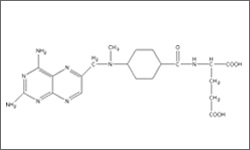Methotrexate

Methotrexate is used to treat a variety of cancers, which include: Choriocarcinoma, Acute lymphocytic leukemia, Large cell lymphoma, High grade lymphoma, Head and neck cancers, Breast cancers, Bladder cancers, Osteogenic Cancers. The dosage used varies with the condition being treated. For example, high dosages are used for cancer patients, whereas skin disorders require lower dosages.1
- 1Chu, E., & DeVita, V. T. (2015). Physicians' cancer chemotherapy drug manual 2015. Burlington, MA: Jones & Bartlett Learning.
Methotrexate is antimetabolite that inhibits folic acid reductase, causing inhibition of DNA synthesis and cellular replication. Inhibition of dihydrofolate reductase (DHFR) is also important because it allows for depletion of critical reduced folates.1
- 1Chu, E., & DeVita, V. T. (2015). Physicians' cancer chemotherapy drug manual 2015. Burlington, MA: Jones & Bartlett Learning.
Methotrexate is very toxic at high doses. Leucovorin (brand name: Wellcovorin®.) may be administered along with the methotrexate to reduce anemia resulting from treatment with methotrexate. Poor side effects include: myelosuppression, mucositis, acute renal failure and possibility of pneumonitis.1
An interactive structure of methotrexate is below.
- 1Chu, E., & DeVita, V. T. (2015). Physicians' cancer chemotherapy drug manual 2015. Burlington, MA: Jones & Bartlett Learning.
Due to the possibly high toxicity of Methotrexate a lot of consideration must be taken by your physician to look at previous conditions and dosages. Extra concern should also be taken in patients with abnormal renal function, patients with late stage bladder cancer and patients with third-space fluid collections (pleural effusion and ascites). Many checks must also be done on a consistent basis to be sure the medication is working properly and effectively.1
- 1Chu, E., & DeVita, V. T. (2015). Physicians' cancer chemotherapy drug manual 2015. Burlington, MA: Jones & Bartlett Learning.
